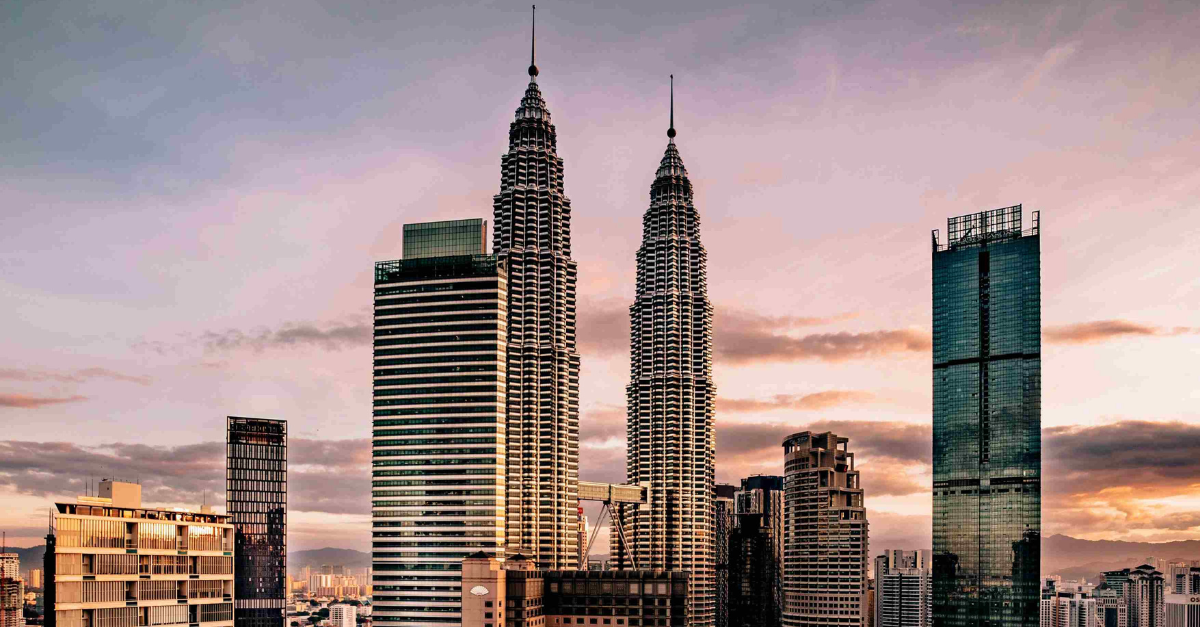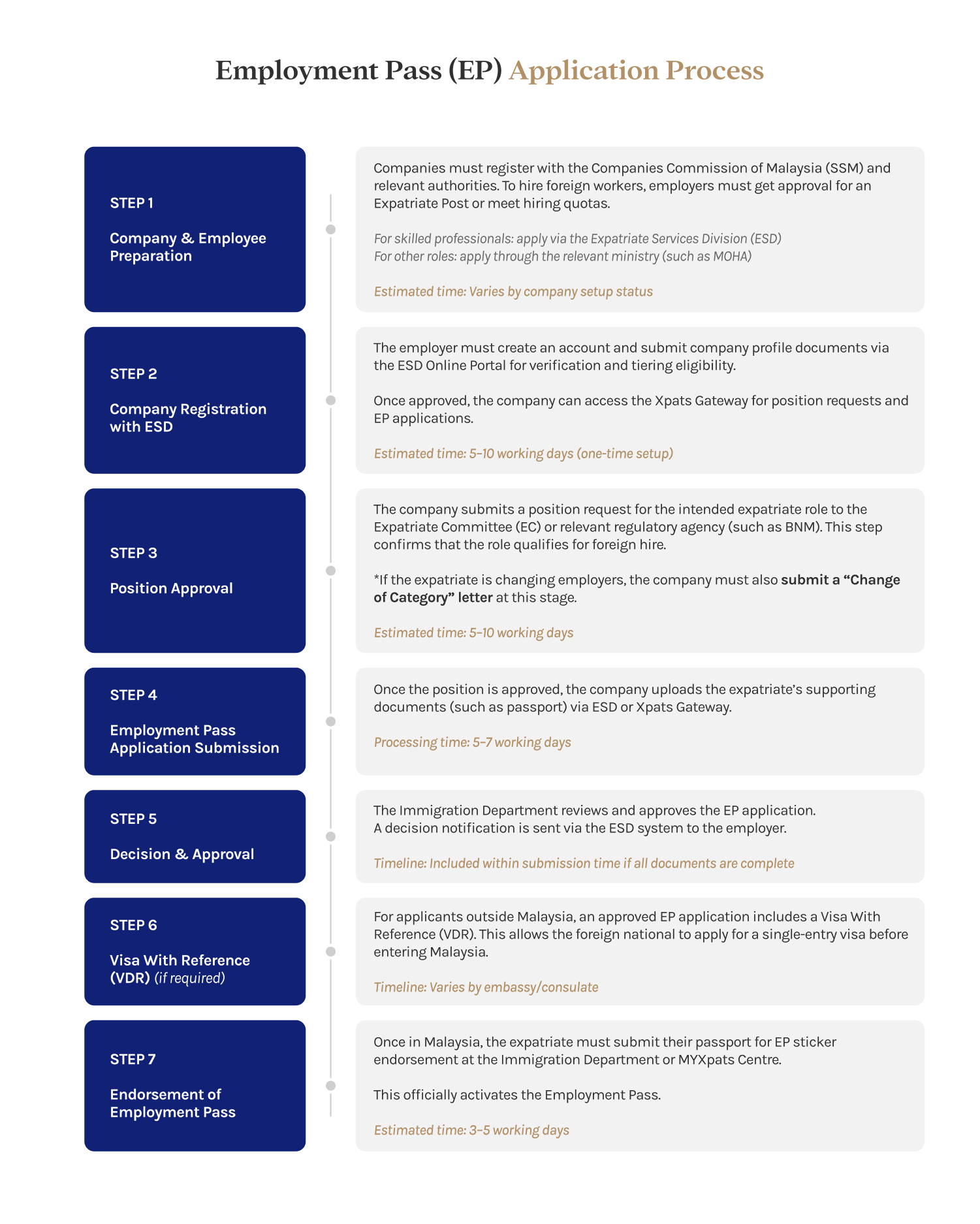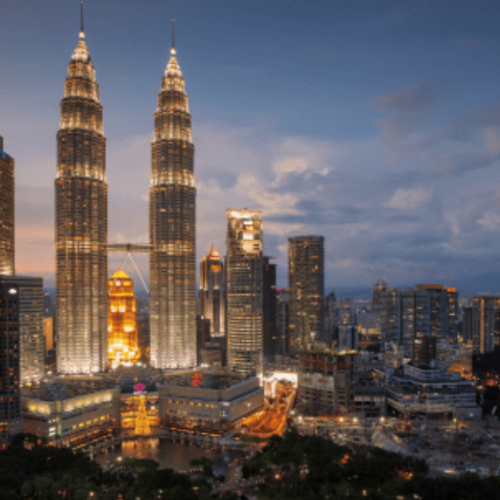16 Oct How to Apply for Malaysia Employment Pass (New Requirements!)

With consistent policies attracting foreign investors, Malaysia is a vibrant hub for foreign professionals and companies to expand their operations. If you are a Malaysian employer seeking to hire global talent, or you are a foreign professional seeking valuable working experience in this dynamic nation, then understanding the Employment (EP) is crucial.
As of 2025, new updates and requirements have been implemented, making it essential for employers and prospective employees to be fully informed.
This guide explains the latest requirements for applying for an Employment Pass (EP) in Malaysia, your eligibility for the various EP categories, and the proper application process to ensure your employment complies with the law.
What is the Employment Pass (EP)?
An Employment Pass (EP) is a key work permit that enables qualified foreign professionals to work legally in Malaysia. Passholders can work for up to five years, based on their contract.
The pass is designed for managers and executives with expertise in specialised or technical roles that are not readily available in the local workforce.
EP holders are often employed in sectors vital to Malaysia’s economy, such as technology, finance, and engineering.
Curious about other key work pass options in Malaysia? Check out our guide: Foreigner Work Permit & Visa Malaysia: Employer’s Guide .
Eligibility Criteria (and Who is Not Eligible)

To qualify for an Employment Pass (EP) in Malaysia, foreign workers must meet specific eligibility criteria designed to attract skilled professionals and support Malaysia’s workforce needs.
Employee Criteria
1. Minimum Salary Thresholds
The minimum salary for EP applicants varies by category. The average monthly income ranges from RM3,000 to over RM10,000, depending on the role and Employment Pass classification.
2. Educational and Professional Qualifications
Applicants must meet one of the following academic and experience combinations:
- Bachelor’s degree or higher with at least 3 years of relevant experience
- Diploma with at least 5 years of experience
- Technical certificate or equivalent with at least 7 years of experience
3. Types of Positions and Sectors Eligible
The Malaysian EP is intended for foreign professionals in specialised or high-skilled roles, including senior management, professional, technical, and niche expertise positions.
EP holders are only permitted to work in approved sectors, and employers must submit an approval letter from the relevant agency based on their industry.
- Industry and Economic Sectors, such as Biotechnology and Construction
- Finance and Markets, such as Financial Services and Securities
- Education and Research
- Information and Communication Technology (ICT) and Innovation
- Tourism, Arts, and Media, such as Broadcasting
- Healthcare, such as Nursing and Allied Sciences
- Special Regional Zones, such as the Iskandar Region
- Niche and Regulated Areas, such as Civil Aviation and Sports
4. Sectors or Roles Not Allowed to Apply
Not all job roles or sectors are eligible for EP applications. The Malaysian government enforces restrictions to protect local employment opportunities and regulate the participation of foreign workers.
- Sectors with Restricted Foreign Involvement
The sectors are primarily within the Distributive Trade Services. These include, but are not limited to:- Small-scale and convenience retail,
such as supermarkets and 24-hour convenience stores - Traditional and local markets
such as wet markets and medical halls - Petrol stations
(with or without convenience stores) - Specific niche retail and Food & Beverages (F&B),
such as textile or jewellery shops - National Strategic Interest
as defined by the relevant authorities
- Small-scale and convenience retail,
- Roles Not Allowed under EP
- Semi-skilled or unskilled labour roles often found in manufacturing, construction, and plantation sectors
-
- Roles easily filled by locals, where employers cannot justify the need for a foreign hire
- Positions in the civil service or government-linked companies (GLCs), which are generally reserved for Malaysian citizens
These criteria will be explained further in the Categories of Employment Pass (EP) section.
Employer Criteria
Companies in Malaysia must follow strict criteria to qualify for employing expatriates. These include:
- Registration with the Expatriate Services Division (ESD) and relevant government bodies, such as the Companies Commission of Malaysia (SSM).To support team: This is a link within the article. DO NOT directly copy paste.
- Meeting paid-up capital requirements, based on business type and ownership structure.
- For joint-venture companies, a minimum of 30% foreign shareholding is required.
Categories of Employment Pass (EP)
The Employment Pass (EP) can be further categorised into three tiers: Employment Pass I, Employment Pass II, and Employment Pass III.
- EP Category I
EP Category I targets high-income expatriate professionals earning a monthly income of RM10,000 or more. It offers a validity of up to 5 years with no renewal limit, ensuring long-term stability.
Eligible roles typically include senior management positions, such as Director, General Manager and C-level executives.
- EP Category II
Category II EP holders are for middle-range professionals earning a monthly salary of RM5,000 to RM9,999. This pass is commonly issued for managerial and professional roles in sectors like IT, engineering, and research.
Eligible positions include Engineers, Researchers, and Project Managers.
- EP Category III
EP Category III is intended for skilled or semi-skilled workers earning RM3,000 to RM4,999 per month. This pass typically supports technical or specialised roles and is issued for shorter contract durations (usually up to 12 months, with limited renewals).
Typical roles include Technicians, Lab Analysts, and skilled technical support staff.
Both Category I and II pass holders are eligible to bring their families to Malaysia. Immediate family members, such as spouses or children under 18 years of age, are eligible for a Dependant Pass (DP). Other family members, such as parents or children over the age of 18, may be eligible to receive a Long-Term Social Visit Pass (LTSVP).
They can also employ a Foreign Domestic Helper, who receives a specific Social Visit Pass (Temporary Employment).
Comparison Table for Employment Pass Categories
| Employment Pass (EP) Category | Basic Monthly Salary | Max. Contract Duration | Dependant Eligibility | Applicable Roles | Renewal Limit |
| Category I | RM10,000 and above | Up to 5 years | Yes | Senior management, C-suite, or highly specialised professionals | No limit |
| Category II | RM5,000 – RM9,999 | Up to 2 years | Yes |
Managerial or professional roles (such as Engineers) |
No limit |
| Category III | RM3,000 – RM4,999 | Up to 12 months | No | Non-executives, technical support or skilled technicians (such as IT Support) | Maximum two renewals (total validity of 3 years) |
How Is EP Different from Other Work Passes in Malaysia?
There are several differences between the Employment Pass (EP) and other main work passes in Malaysia. These distinctions are based on factors such as purpose, sector, salary range, contract validity, and other relevant criteria.
Comparison Table between the Employment Pass and Other Key Employment Passes
| Feature | Employment Pass (EP) | Professional Visit Pass (PVP) | Temporary Employment Pass (TEP) | Foreign Domestic Helper
(FDH) Visa |
| Purpose | Long-term, skilled employment | Short-term professional services or training | Low-skilled or semi-skilled employment | Employment as a domestic helper |
| Primary Holder | An expatriate employed by a Malaysian company | An expatriate employed by an overseas company, serving Malaysia | Foreign workers in specific sectors | Foreign female worker |
| Duration | Up to 5 years (renewable) | Up to 12 months (non-renewable or limited extension) | Up to 12 months (renewable annually, maximum 10 years) | Up to 12 months (renewable annually) |
| Dependant Eligibility | Yes for EP Category I & II holders | No | No | No |
| Employer Binding | Yes (cannot change without new EP) | No (remains employed by overseas company) | Yes | Yes |
| Typical Roles | Managerial, executive, or technical, specialist roles | Consultants, trainers, auditors, or specialists | Manufacturing, construction, or plantation sectors | Live-in domestic helper |
| Skill Level | High | High (specialised) | Low to semi-skilled | Low-skilled |
| Minimum Salary | Varies by category (RM3,000-10,000) | No explicit minimum (paid by overseas company) | Typically below RM5,000 | Fixed rates by nationality or country |
Family Pass Types for EP Holders
Employment Pass holders (specifically Category I and II) are permitted to bring their families to Malaysia. However, different family members qualify for different types of passes. The Dependant Pass (DP) and Long-Term Social Visit Pass (LTSVP) are the primary options, each with distinct eligibility criteria:
| Feature | Dependant Pass (DP) | Long-Term Social Visit Pass (LTSVP) |
| Purpose | For the immediate family to reside with the EP holder | For other close family members to reside with the EP holder |
| Eligible Family Members |
Legal spouse, children under 18 years old (biological, adopted or stepchildren), or disabled children of any age |
Parents or parents-in-law, children over 18 years old, or common-law spouse |
| Primary Holder Link | Directly linked to EP holder’s validity (Category I & II) |
Linked to EP holder’s validity (Category I & II) |
| Duration | Matches the EP holder’s pass validity | Up to 6-12 months initially, renewable up to 5 years (aligned with EP) |
| Work Rights | Not permitted to work directly; must convert to EP if seeking employment | Not allowed to work directly; must convert to EP if seeking employment |
| Eligibility Note | Only for EP Category I and II holders to sponsor | Only for EP Category I and II holders to sponsor |
Need help applying for an Employment Pass or choosing the correct work visa? At Moore-Bzi, our experts will guide you through every step of your EP application in Malaysia.
What is New in 2025? Key Update for Employment Pass (EP)
Malaysia’s Employment Pass process has been updated in 2025 to improve efficiency, enforce compliance, and streamline applications. Below are the key changes to be aware of:
- Online Appeal System (Effective May 2, 2025)
EP and PVP- Expert appeals can now be submitted directly through the ESD online portal, eliminating the need to visit the MYXpats Centre. - Mandatory “Change of Category” Letter for Job Transfers (Effective January 1, 2025)
EP holders switching employers must include a Change of Category Letter during the approval stage. This applies even if the pass category remains the same. - 6-Month Cooling-Off Period for Non-Compliant Companies (Effective July 1, 2025)
Companies found to be breaching ESD rules (such as hiring without valid approval) may face a 6-month freeze on new applications. - EP Category III Salary Exemption Required
Applications for EP Category III now require a salary exemption letter from the Ministry of Home Affairs (MOHA) before submission. - Tier-Based Support Letter Approval Timeline
- Tier 1, 2, and critical sectors (Fast Track): Processed within three working days
- Tier 3–5 (Normal Track): Processed within 10 working days
Step-by-Step Application Process

Expatriates are not eligible to apply for the Employment Pass (EP)on their own. The hiring company must apply to the Expatriate Services Division (ESD) online platform.
All EP applications must be endorsed by the Expatriate Committee (EC) or the relevant regulatory agency, depending on the sector. Below is a flowchart illustrating the application steps:
Employment Pass (EP) Application Process

Supporting Documents Checklist
To ensure a successful Employment Pass application in Malaysia, both employees and employers must prepare the necessary documents. Here is a simplified checklist for both parties:
For Employers (Documents to submit via ESD Online & Xpats Gateway)
- Company Registration Documents
- Cover letter and Letter of Undertaking
- Authorised signatory (from the director or authorised signatory)
- Certified SSM forms (Forms 5, 9, 24, 49)
- Sector Approval Letter (if applicable)
- From a relevant regulatory agency (e.g. MIDA, BNM, MOE)
- Company Compliance Documents
- Proof of paid-up capital/equity (for ESD Tiering)
- Labour Department & PERKESO compliance confirmation
- Job and Contract Details
- Signed employment contract (on company letterhead, stamped by LHDN
- Job description
- Company salary and contract duration
- Security bond (if required)
- Change of Category letter (new requirements)
For Employees
- Passport & Photo
- Full copy of passport (valid for at least 12 months)
- Recent passport-size photo (meets ESD specs)
- Qualifications & Experience
- Highest academic certificate
- Professional certificates (if applicable)
- Updated CV or résumé
- Employment Details
- Job description (from employer)
- Salary details (If renewing: latest 3 months’ payslips, EA form, or Tax return)
- Additional Documents (if applicable)
- Release letter (for change of employer)
- Statutory declaration (example: for a lost passport)
For the complete list of required documents and latest updates, please refer to the official government website or check with expert work permit consultants such as Moore-Bzi.
Latest Posts
Simplify Foreign Hiring with Trusted Work Visa Guides:
Get personalised guidance from Moore-Bzi, trusted professionals in Malaysian work permits, visas, and business compliance.

Benefits of the Employment Pass

The Employment Pass (EP) in Malaysia offers several advantages for qualified foreign professionals and their families:
- Long-Term Stay and Work Rights
EP holders are legally permitted to reside and work in Malaysia for extended periods, up to 5 years for Category I and renewable terms for Categories II and III.
- Family Privileges
Category I and II EP holders are permitted to bring their family members and foreign domestic helpers to Malaysia. This is subject to the type of pass and the type of family members, such as a Dependant Pass (DP).
- Access to Key Growth Sectors
EP holders can build careers in high-demand industries such as ICT, finance, and biotechnology, contributing to Malaysia’s digital economy and innovation ecosystem.
- Possible Tax Incentives
Some sectors may offer personal income tax exemptions or incentives under special programs, particularly for senior roles or in regulated industries.
Handling Application Rejections and Appeal Process
While many Employment Pass (EP) applications are approved smoothly, rejections can occur due to compliance issues or gaps in documentation. Here’s how to reduce the risk and what to do if your application is rejected.
Common Reasons for Rejection
- Incomplete or incorrect documents, such as missing signatures and unverified certificates.
- Position or sector not eligible under EP guidelines.
- Insufficient salary or qualifications for the selected EP category.
- Company non-compliance, such as unpaid statutory contributions or not being registered with ESD.
- Failure to justify the need for a foreign hire over local talent.
What to Do After a Rejection
If your EP application is rejected:
- Review the rejection notice via the ESD portal.
- Identify the stated reasons, as most are administrative or eligibility-related.
- Correct and complete missing information, if applicable.
How to File an Appeal
- Appeals must be submitted online through the ESD system by the employer only.
- Submit within the allowed appeal period (usually within 6 months).
- Include a cover letter, updated or missing documents, and a clear explanation of rectifications.
Tips to Strengthen an Appeal
- Address all reasons stated in the rejection.
- Attach clarifying documents like a detailed job description, salary justification, or market shortage evidence.
- Ensure company compliance records are up-to-date.
- Provide sector agency support letters if relevant.
Conclusion
Companies and prospective foreign talent need to stay up-to-date on the latest Malaysian Employment Pass (EP) procedures. This is to ensure that both parties remain compliant and avoid unnecessary delays.
Early preparation, proper documentation, and understanding the current requirements are crucial to a smooth work pass application process in Malaysia. Always stay informed by visiting official government websites or consulting an experienced visa specialist, such as Moore-Bzi, for tailored guidance. Contact us today for expert assistance.
FAQ
What happens if my EP is revoked or my job ends early?
If your Employment Pass (EP) is revoked or your employment ends before the pass expiry, you must cancel the EP through your employer and exit Malaysia within the allowed grace period (typically 30 days). Overstaying may result in penalties or a future entry ban.
Is medical screening compulsory?
Yes. All new EP applicants are required to undergo a medical screening at a registered clinic within 30 days of arrival in Malaysia. Failure to complete the screening may result in the cancellation of your pass or non-endorsement.
Can EP holders apply for PR later?
Yes, but it is not automatic. EP holders and other holders of a work pass in Malaysia may apply for Permanent Resident (PR) status after residing in Malaysia for a minimum of five consecutive years, subject to approval by the Immigration Department and other conditions.
Can I travel in and out of Malaysia while holding an EP?
Yes. Employment Pass holders are allowed to enter and exit Malaysia freely during the validity period of their pass. However, ensure your passport and EP remain valid at all times to avoid re-entry issues.






